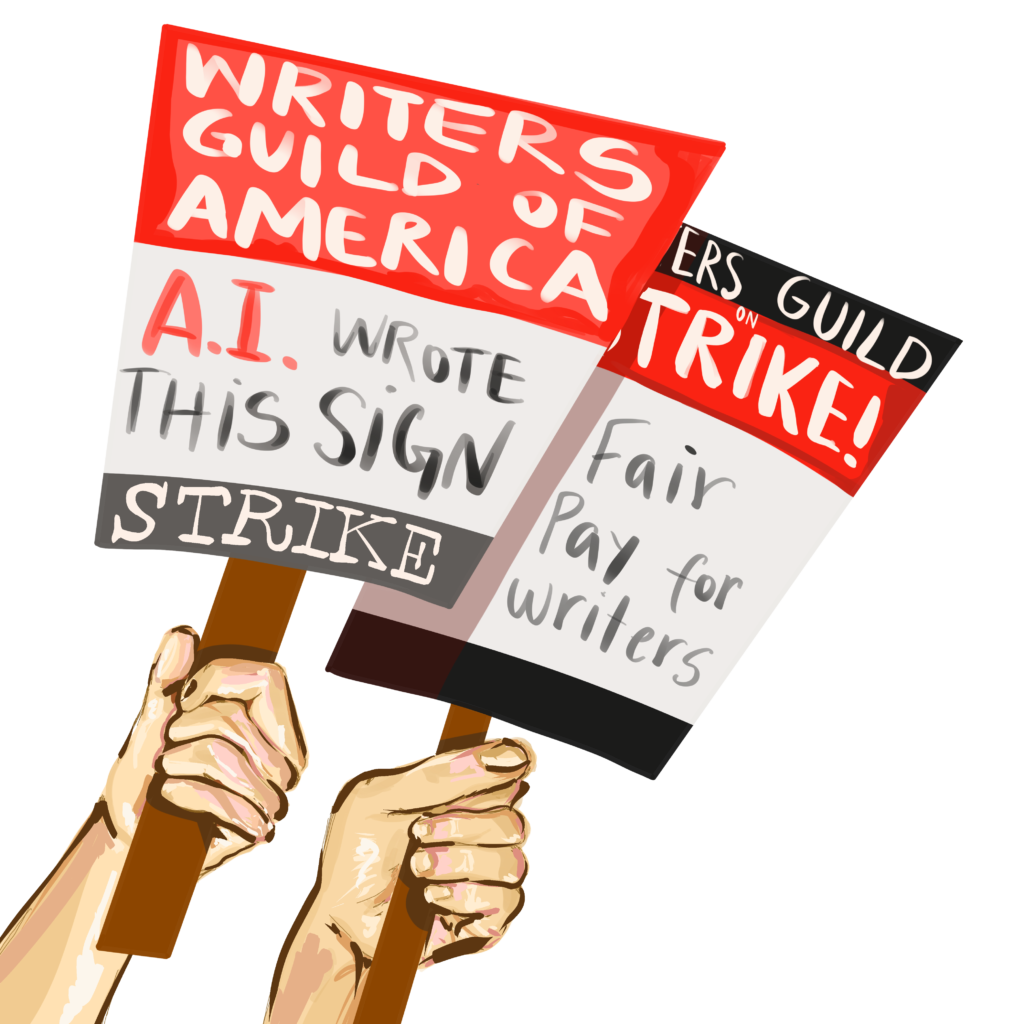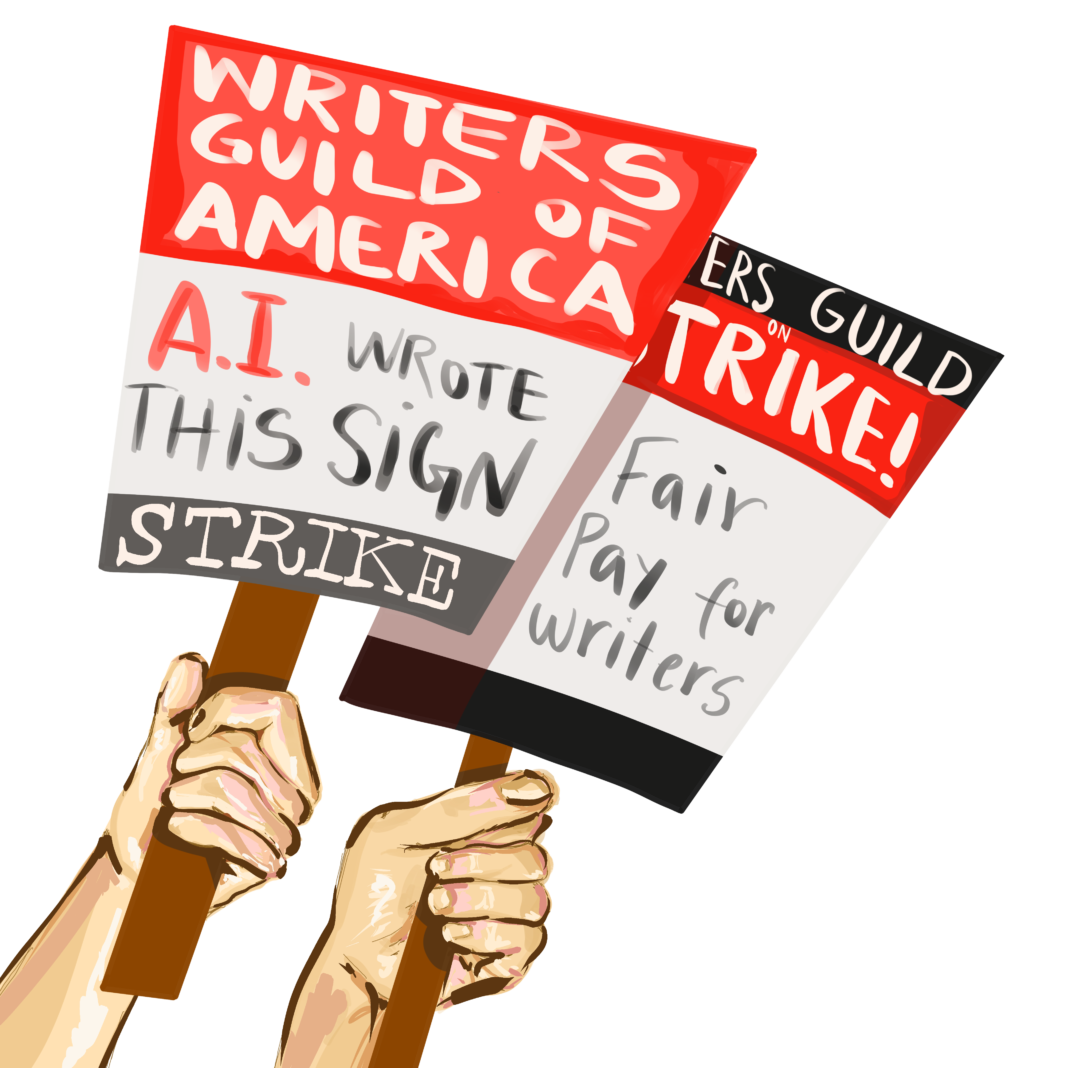
Entertainment industries constantly battle to create the next record-breaking blockbuster — while spending millions in the process. Such industries are using artificial intelligence to decrease costs as the fight roars, putting actors and writers jobs at risk.
If time is money, then Hollywood is still broke. The COVID-19 pandemic made consumer interest exceed active production, making demand greater than supply.
The entertainment industry started its search for an effective way to reduce costs as spending millions on films has become the norm. The corporations chose their target: wages.
Why reduce wages when you can eliminate them? Enter AI.
Entertainment titans like the Warner Brothers and Netflix began financing films as the pandemic started to clear. Writers and actors alike breathed a sigh of relief as the traditionally-risky industry miraculously became one of America’s most stable due to streaming services. However, the bliss was short-lived.
Mass production led to mass employment, and these studios had to provide these additional workers with salaries and health benefits.
AI can instantly generate unique plot lines and compelling characters, a task that may take human writers anywhere from several days to several years. As a result, AI has been increasingly used in writer’s rooms to speed along the writing process.
With AI becoming more capable of crafting artistic pieces, writers and actors fear they will have to battle the technology for credit and employment.
Marvel’s “WandaVision” miniseries entered controversy as its use of AI-generated background actors was revealed. Background actress Alexandria Rubalcaba recalled the instructions she received to create her digital replica.
“Have your hands out. Have your hands in. Look this way. Look that way. Let us see your scared face. Let us see your surprised face,” Rubalcaba said in an interview with NPR. “I fear that AI is eventually going to weed out background actors. They won’t have any use for us anymore.”
Voices of deceased actors like Anthony Bourdain and Andy Warhol have been recreated for projects, sparking a debate over AI ethics.
The Writer’s Guild of America aims to prevent writings by AI from being considered “literary material” — the phrase used in contracts to define scripts a screenwriter produces.
The Alliance of Motion Pictures and Television Producers (AMPTP), the organization writers were striking against, confirmed that AI-generated writing material can’t receive credit, but this decision is a double-edged sword.
Writers began asking the question: if any evidence of AI is found in a script, can it be considered literary material at all?
Some writers have begun using AI as a resource to gain inspiration and information. If AMPTP’s standards don’t change, writers are at risk of losing credit.
The Screen Actors Guild (SAG) exposed the AMPTP’s position on AI after the SAG strike was declared on July 13.
In a statement, SAG accused AMPTP of wanting to “scan a background performer’s image, pay them for half a day’s labor and then use an individual’s likeness for any purpose forever without their consent.”
Despite AMPTP claiming SAG’s statement is a “deliberate distortion,” tensions erupted and actors took to the picket lines to strike alongside writers.
“Let’s replace studio execs with AI!” and “I told ChatGPT to write a picket sign and it sucked” became common phrases on picket signs.
Entertainment titans produced numerous films of high acclaim, but they weren’t satisfied and sought AI for cheaper work. Despite success, the titans sacrificed their workers for more profit. Their self-inflicted fall began as greed consumed them whole.
The outcome of the Hollywood strike could set a precedent for how laborers are protected from AI or robotic replacements in the future.
“I think it’s a conversation now about the culture of big business, and how it treats everybody up and down the ladder in the name of profit,” said Fran Drescher, current president of the SAG.
AI will continue to learn as it becomes more capable of mimicking human activity. Though the WGA reached a deal with the AMPTP on Sep. 24, SAG continues its fight for actor protections.
“Though AI is a tool that can be utilized, it’ll never be as good or creative as people,” said Claire Meder, president of the Cinematic Arts Commission and a third-year student studying marine biology and environmental science. “Using AI overpaid writers just really comes off as cheap and diminishes writer’s hard work.”







